- Home
- Louisa May Alcott
The Annotated Little Women Page 51
The Annotated Little Women Read online
Page 51
All but two chapters of Alcott’s manuscript of Little Women have been lost. This page from “Our Foreign Correspondent” is among the few to have escaped the teeth of time. (Concord Free Public Library)
“It was all heavenly, but I was glad to see the Irish coast, and found it very lovely, so green and sunny, with brown cabins here and there, ruins on some of the hills, and gentlemen’s country-seats in the valleys, with deer feeding in the parks. It was early in the morning, but I didn’t regret getting up to see it, for the bay was full of little boats, the shore so picturesque, and a rosy sky over head; I never shall forget it.
“At Queenstown one of my new acquaintances left us,—Mr. Lennox,—and when I said something about the Lakes of Killarney, he sighed, and sung, with a look at me,—
‘Oh, have you e’er heard of Kate Kearney,
She lives on the banks of Killarney;
From the glance of her eye,
Shun danger and fly,
For fatal’s the glance of Kate Kearney.’4
Wasn’t that nonsensical?
“We only stopped at Liverpool a few hours. It’s a dirty, noisy place, and I was glad to leave it.5 Uncle rushed out and bought a pair of dog-skin gloves, some ugly, thick shoes, and an umbrella, and got shaved à la mutton-chop, the first thing. Then he flattered himself that he looked like a true Briton; but the first time he had the mud cleaned off his shoes, the little boot-black knew that an American stood in them, and said, with a grin, ‘There yer har, sir, I’ve give ’em the latest Yankee shine.’ It amused uncle immensely. Oh, I must tell you what that absurd Lennox did! He got his friend Ward, who came on with us, to order a bouquet for me, and the first thing I saw in my room, was a lovely one, with ‘Robert Lennox’s compliments,’ on the card. Wasn’t that fun, girls? I like travelling.
“I never shall get to London if I don’t hurry. The trip was like riding through a long picture-gallery, full of lovely landscapes. The farm-houses were my delight; with thatched roofs, ivy up to the eaves, latticed windows, and stout women with rosy children at the doors. The very cattle looked more tranquil than ours, as they stood knee-deep in clover,6 and the hens had a contented cluck, as if they never got nervous, like Yankee biddies. Such perfect color I never saw—the grass so green, sky so blue, grain so yellow, woods so dark—I was in a rapture all the way. So was Flo; and we kept bouncing from one side to the other, trying to see everything while we were whisking along at the rate of sixty miles an hour. Aunt was tired, and went to sleep, but uncle read his guide-book, and wouldn’t be astonished at anything. This is the way we went on: Amy flying up,—‘Oh, that must be Kenilworth,7 that gray place among the trees!’ Flo darting to my window,—‘How sweet; we must go there some time, won’t we, pa?’ Uncle calmly admiring his boots,—‘No my dear, not unless you want beer; that’s a brewery.’
In 1870–71, two years after Little Women was published, May Alcott joined Louisa and their mutual friend Alice Bartlett on a grand tour of western Europe. Here, May clowns for the camera as Bartlett looks on. (Louisa May Alcott Memorial Association)
“A pause,—then Flo cried out, ‘Bless me, there’s a gallows and a man going up.’ ‘Where, where!’ shrieks Amy, staring out at two tall posts with a cross-beam, and some dangling chains. ‘A colliery,’ remarks uncle, with a twinkle of the eye. ‘Here’s a lovely flock of lambs all lying down,’ says Amy. ‘See, pa, aren’t they pretty!’ added Flo, sentimentally. ‘Geese, young ladies,’ returns uncle, in a tone that keeps us quiet till Flo settles down to enjoy ‘The Flirtations of Capt. Cavendish,’8 and I have the scenery all to myself.
In the last year of her life, May Alcott published a book of advice for aspiring artists, Studying Art Abroad, and How to Do It Cheaply. The cover and title page are seen here. (Louisa May Alcott Memorial Association)
“Of course it rained when we got to London, and there was nothing to be seen but fog and umbrellas. We rested, unpacked, and shopped a little between the showers. Aunt Mary got me some new things, for I came off in such a hurry I wasn’t half ready. A sweet white hat and blue feather, a distracting muslin to match, and the loveliest mantle you ever saw. Shopping in Regent Street9 is perfectly splendid; things seem so cheap—nice ribbons only sixpence a yard. I laid in a stock, but shall get my gloves in Paris. Don’t that sound sort of elegant and rich?
“Flo and I, for the fun of it, ordered a Hansom cab,10 while aunt and uncle were out, and went for a drive, though we learned afterward that it wasn’t the thing for young ladies to ride in them alone. It was so droll! for when we were shut in by the wooden apron, the man drove so fast that Flo was frightened, and told me to stop him. But he was up outside behind somewhere, and I couldn’t get at him. He didn’t hear me call, nor see me flap my parasol in front, and there we were, quite helpless, rattling away, and whirling round corners, at a breakneck pace. At last, in my despair, I saw a little door in the roof, and on poking it open, a red eye appeared, and a beery voice said,—
“ ‘Now then, mum?’
“I gave my order as soberly as I could, and slamming down the door, with a ‘Aye, aye, mum,’ the old thing made his horse walk, as if going to a funeral. I poked again, and said, ‘A little faster;’ then off he went, helter-skelter, as before, and we resigned ourselves to our fate.
“To-day was fair, and we went to Hyde Park,11 close by, for we are more aristocratic than we look. The Duke of Devonshire12 lives near. I often see his footmen lounging at the back gate; and the Duke of Wellington’s house13 is not far off. Such sights as I saw, my dear! It was as good as Punch,14for there were fat dowagers, rolling about in their red and yellow coaches, with gorgeous Jeameses15 in silk stockings and velvet coats, up behind, and powdered coachmen in front. Smart maids, with the rosiest children I ever saw; handsome girls, looking half asleep; dandies, in queer English hats and lavender kids, lounging about, and tall soldiers, in short red jackets and muffin caps stuck on one side, looking so funny, I longed to sketch them.
“Rotten Row means ‘Route de Roi,’ or the king’s way; but now it’s more like a riding-school than anything else. The horses are splendid, and the men, especially the grooms, ride well, but the women are stiff, and bounce, which isn’t according to our rules. I longed to show them a tearing American gallop, for they trotted solemnly up and down in their scant habits and high hats, looking like the women in a toy Noah’s Ark. Every one rides—old men, stout ladies, little children, and the young folks do a deal of flirting here; I saw a pair exchange rosebuds, for it’s the thing to wear one in the button-hole, and I thought it rather a nice little idea.
“In the P.M. to Westminster Abbey; but don’t expect me to describe it, that’s impossible—so I’ll only say it was sublime!16 This evening we are going to see Fechter,17 which will be an appropriate end to the happiest day of my life.
A Punch cartoon from the year of Little Women’s publication. (Punch magazine, May 23, 1868)
“Midnight.
“It’s very late, but I can’t let my letter go in the morning without telling you what happened last evening. Who do you think came in, as we were at tea? Laurie’s English friends, Fred and Frank Vaughn! I was so surprised, for I shouldn’t have known them, but for the cards. Both are tall fellows, with whiskers; Fred handsome in the English style, and Frank much better, for he only limps slightly, and uses no crutches. They had heard from Laurie where we were to be, and came to ask us to their house, but uncle won’t go, so we shall return the call, and see them as we can. They went to the theatre with us, and we did have such a good time, for Frank devoted himself to Flo, and Fred and I talked over past, present and future fun as if we had known each other all our days. Tell Beth Frank asked for her, and was sorry to hear of her ill health. Fred laughed when I spoke of Jo, and sent his ‘respectful compliments to the big hat.’ Neither of them had forgotten Camp Laurence, or the fun we had there. What ages ago it seems, don’t it?
Born in London to French parents, Charles Albert Fechter (1824–1879) dreamed of wi
nning fame as a sculptor. Instead, he became one of Europe’s most respected tragic actors. He appears here as Ruy Blas. (V&A Images, London / Art Resource, NY)
“Aunt is tapping on the wall for the third time, so I must stop. I really feel like a dissipated London fine lady, writing here so late, with my room full of pretty things, and my head a jumble of parks, theatres, new gowns and gallant creatures, who say ‘Ah,’ and twirl their blond mustaches, with the true English lordliness. I long to see you all, and in spite of my nonsense am, as ever, your loving AMY.”
“PARIS.
“DEAR GIRLS:
“In my last I told you about our London visit,—how kind the Vaughns were, and what pleasant parties they made for us. I enjoyed the trips to Hampton Court and the Kensington Museum, more than anything else,—for at Hampton I saw Raphael’s Cartoons,18 and, at the Museum, rooms full of pictures by Turner, Lawrence, Reynolds, Hogarth,19 and the other great creatures. The day in Richmond Park20 was charming,—for we had a regular English picnic,—and I had more splendid oaks and groups of deer than I could copy; also heard a nightingale, and saw larks go up. We ‘did’ London to our hearts’ content,—thanks to Fred and Frank,—and were sorry to go away; for, though English people are slow to take you in, when they once make up their minds to do it they cannot be outdone in hospitality, I think. The Vaughns hope to meet us in Rome next winter, and I shall be dreadfully disappointed if they don’t, for Grace and I are great friends, and the boys very nice fellows,—especially Fred.
“Well, we were hardly settled here when he turned up again, saying he had come for a holiday, and was going to Switzerland. Aunt looked sober at first, but he was so cool about it she couldn’t say a word; and now we get on nicely, and are very glad he came, for he speaks French21 like a native, and I don’t know what we should do without him. Uncle don’t know ten words, and insists on talking English very loud, as if that would make people understand him. Aunt’s pronunciation is old-fashioned, and Flo and I, though we flattered ourselves that we knew a good deal, find we don’t, and are very grateful to have Fred do the ‘parley-vooing,’ as uncle calls it.
“Such delightful times as we are having! sight-seeing from morning till night! stopping for nice lunches in the gay cafés, and meeting with all sorts of droll adventures. Rainy days I spend in the Louvre, reveling in pictures. Jo would turn up her naughty nose at some of the finest, because she has no soul for art; but I have, and I’m cultivating eye and taste as fast as I can. She would like the relics of great people better, for I’ve seen her Napoleon’s cocked hat and gray coat, his baby’s cradle and his old toothbrush; also Marie Antoinette’s little shoe, the ring of Saint Denis, Charlemagne’s sword,22 and many other interesting things. I’ll talk for hours about them when I come, but haven’t time to write.
“The Palais Royale23 is a heavenly place,—so full of bijouterie and lovely things that I’m nearly distracted because I can’t buy them. Fred wanted to get me some, but of course I didn’t allow it. Then the Bois and the Champs Elysées are tres magnifique. I’ve seen the imperial family several times,—the Emperor an ugly, hard-looking man,24 the Empress pale and pretty, but dressed in horrid taste, I thought,—purple dress, green hat, and yellow gloves. Little Nap. is a handsome boy, who sits chatting to his tutor, and kisses his hand to the people as he passes in his four-horse barouche, with postilions in red satin jackets, and a mounted guard before and behind.
“We often walk in the Tuileries gardens, for they are lovely, though the antique Luxembourg25 gardens suit me better. Pere la Chaise is very curious,—for many of the tombs are like small rooms, and, looking in, one sees a table, with images or pictures of the dead, and chairs for the mourners to sit in when they come to lament. That is so Frenchy,—n’est ce pas?26
“Our rooms are on the Rue de Rivoli,27 and, sitting in the balcony, we look up and down the long, brilliant street. It is so pleasant that we spend our evenings talking there,—when too tired with our day’s work to go out. Fred is very entertaining, and is altogether the most agreeable young man I ever knew,—except Laurie,—whose manners are more charming. I wish Fred was dark, for I don’t fancy light men; however, the Vaughns are very rich, and come of an excellent family, so I won’t find fault with their yellow hair, as my own is yellower.
“Next week we are off to Germany and Switzerland; and, as we shall travel fast, I shall only be able to give you hasty letters. I keep my diary, and try to ‘remember correctly and describe clearly all that I see and admire,’ as father advised. It is good practice for me, and, with my sketch-book, will give you a better idea of my tour than these scribbles.
“Adieu; I embrace you tenderly.
“Votre Amie.”
Napoléon III (1808–1873), emperor of the French, posed for this formal portrait with the Empress Eugénie (1826–1920) and their son, Napoléon Eugène (1856–1879), the prince imperial. (Adoc-photos / Art Resource, NY)
“HEIDELBERG.
“MY DEAR MAMMA:
“Having a quiet hour before we leave for Berne, I’ll try to tell you what has happened, for some of it is very important, as you will see.
“The sail up the Rhine was perfect, and I just sat and enjoyed it with all my might. Get father’s old guide-books, and read about it; I haven’t words beautiful enough to describe it. At Coblentz we had a lovely time, for some students from Bonn, with whom Fred got acquainted on the boat, gave us a serenade. It was a moonlight night,28 and, about one o’clock, Flo and I were waked by the most delicious music under our windows. We flew up, and hid behind the curtains; but sly peeps showed us Fred and the students singing away down below. It was the most romantic thing I ever saw; the river, the bridge of boats, the great fortress opposite, moonlight everywhere, and music fit to melt a heart of stone.
Édouard Manet painted his canvas Music in the Tuileries in 1862, three years before the Gardens were visited by Alcott. (National Gallery, London, UK / Bridgeman Images)
“When they were done we threw down some flowers, and saw them scramble for them, kiss their hands to the invisible ladies, and go laughing away,—to smoke, and drink beer, I suppose. Next morning Fred showed me one of the crumpled flowers in his vest pocket, and looked very sentimental. I laughed at him, and said I didn’t throw it, but Flo,—which seemed to disgust him, for he tossed it out of the window, and turned sensible again. I’m afraid I’m going to have trouble with that boy,—it begins to look like it.
“The baths at Nassau were very gay, so was Baden-Baden, where Fred lost some money,29 and I scolded him. He needs some one to look after him when Frank is not with him. Kate said once she hoped he’d marry soon, and I quite agree with her that it would be well for him. Frankfort was delightful;30 I saw Goethe’s house, Schiller’s statue, and Dannecker’s famous ‘Ariadne.’31 It was very lovely, but I should have enjoyed it more if I had known the story better. I didn’t like to ask, as every one knew it, or pretended they did. I wish Jo would tell me all about it; I ought to have read more, for I find I don’t know anything, and it mortifies me.
“Now comes the serious part,—for it happened here, and Fred is just gone. He has been so kind and jolly that we all got quite fond of him; I never thought of anything but a travelling friendship, till the serenade night. Since then I’ve begun to feel that the moonlight walks, balcony talks, and daily adventures were something more to him than fun. I haven’t flirted, mother, truly,—but remembered what you said to me, and have done my very best. I can’t help it if people like me; I don’t try to make them, and it worries me if I don’t care for them, though Jo says I haven’t got any heart. Now I know mother will shake her head, and the girls say, ‘Oh, the mercenary little wretch!’ but I’ve made up my mind, and, if Fred asks me, I shall accept him, though I’m not madly in love. I like him, and we get on comfortably together. He is handsome, young, clever enough, and very rich,—ever so much richer than the Laurences. I don’t think his family would object, and I should be very happy, for they are all kind, well-bred,
generous people, and they like me. Fred, as the eldest twin, will have the estate, I suppose,—and such a splendid one as it is! A city house, in a fashionable street,—not so showy as our big houses, but twice as comfortable, and full of solid luxury, such as English people believe in. I like it, for it’s genuine; I’ve seen the plate, the family jewels, the old servants, and pictures of the country place with its park, great house, lovely grounds, and fine horses. Oh, it would be all I should ask! and I’d rather have it than any title such as girls snap up so readily, and find nothing behind. I may be mercenary, but I hate poverty, and don’t mean to bear it a minute longer than I can help. One of us must marry well; Meg didn’t, Jo won’t, Beth can’t, yet,—so I shall, and make everything cosy all round. I wouldn’t marry a man I hated or despised. You may be sure of that; and, though Fred is not my model hero, he does very well, and, in time, I should get fond enough of him if he was very fond of me, and let me do just as I liked. So I’ve been turning the matter over in my mind the last week,—for it was impossible to help seeing that Fred liked me. He said nothing, but little things showed it; he never goes with Flo, always gets on my side of the carriage, table, or promenade, looks sentimental when we are alone, and frowns at any one else who ventures to speak to me. Yesterday, at dinner, when an Austrian officer stared at us, and then said something to his friend,—a rakish-looking Baron,—about ‘ein wonderschönes Blöndchen,’32 Fred looked as fierce as a lion, and cut his meat so savagely, it nearly flew off his plate. He isn’t one of the cool, stiff Englishmen, but is rather peppery, for he has Scotch blood in him, as one might guess from his bonnie blue eyes.

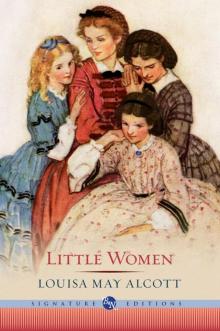 Little Women
Little Women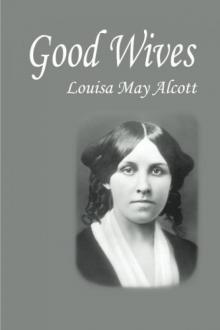 Good Wives
Good Wives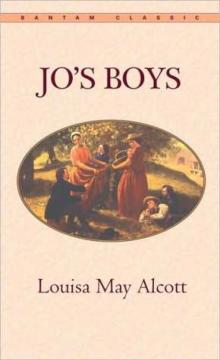 Jo's Boys
Jo's Boys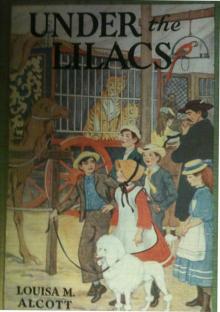 Under the Lilacs
Under the Lilacs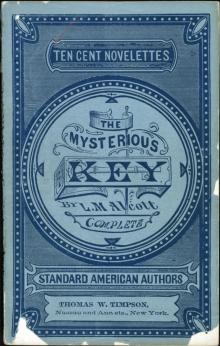 The Mysterious Key and What It Opened
The Mysterious Key and What It Opened The Inheritance
The Inheritance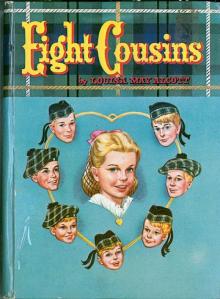 Eight Cousins
Eight Cousins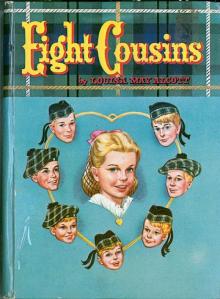 Eight Cousins; Or, The Aunt-Hill
Eight Cousins; Or, The Aunt-Hill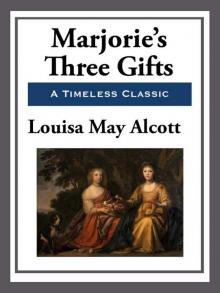 Marjorie's Three Gifts
Marjorie's Three Gifts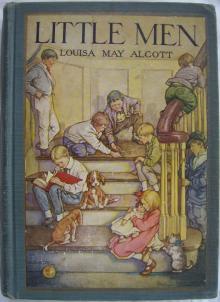 Little Men
Little Men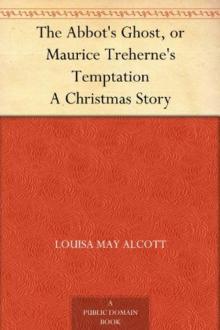 The Abbot's Ghost, or Maurice Treherne's Temptation: A Christmas Story
The Abbot's Ghost, or Maurice Treherne's Temptation: A Christmas Story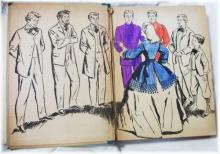 Rose in Bloom
Rose in Bloom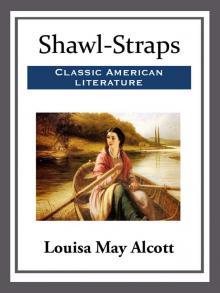 Shawl-Straps
Shawl-Straps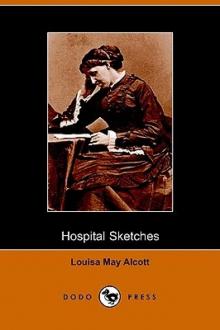 Hospital Sketches
Hospital Sketches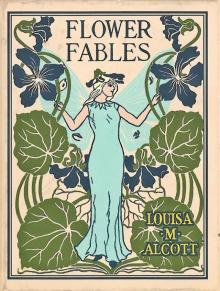 Flower Fables
Flower Fables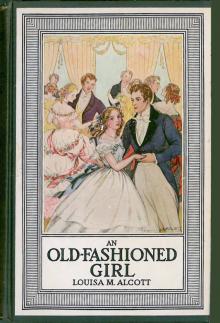 An Old-Fashioned Girl
An Old-Fashioned Girl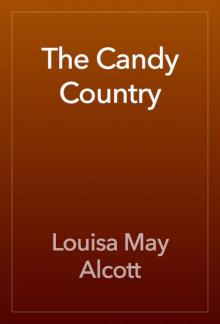 The Candy Country
The Candy Country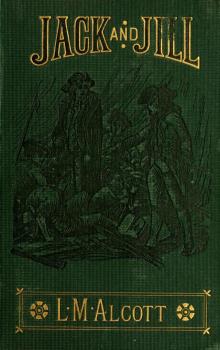 Jack and Jill
Jack and Jill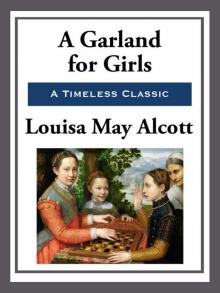 A Garland for Girls
A Garland for Girls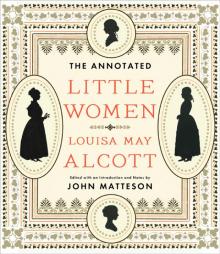 The Annotated Little Women
The Annotated Little Women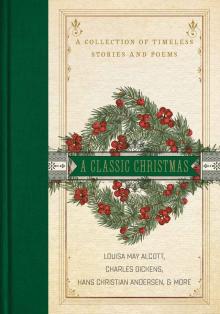 A Classic Christmas
A Classic Christmas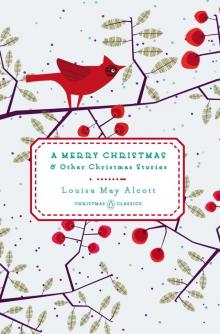 A Merry Christmas
A Merry Christmas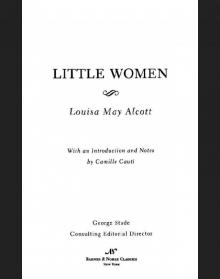 Little Women (Barnes & Noble Classics Series)
Little Women (Barnes & Noble Classics Series)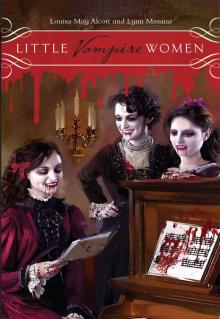 Little Vampire Women
Little Vampire Women